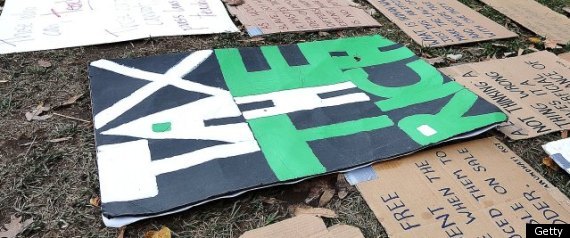 As large as the income gap between rich and everyone else is today, one area of the economy has an even wider gulf to bridge.
As large as the income gap between rich and everyone else is today, one area of the economy has an even wider gulf to bridge. The top 0.1 percent of earners are netting half of all capital gains -- or gains on the sale of shares or property -- according to Forbes. That means that 315,000 Americans are benefiting disproportionately from the financial transaction, which accounts for 60 percent of the income of the Forbes 400.
(Read the entires Forbes piece here)
Capital gains have been featured prominently in the debate over how best to overhaul the tax code and reduce the budget deficit. That's because capital gains, which largely benefit the wealthy, are taxed at a rate of about 15 percent -- lower than the 26.5 percent top effective tax rate paid by households making less than $100,000 in 2006.
The discrepancy in tax rates exacerbates the widening wealth gap. After accounting for taxes, the top one percent of earners saw their incomes grow by 275 percent between 1979 and 2007, according to the Congressional Budget Office, while the bottom fifth of earners saw their incomes grow by just 20 percent during the same period. In addition, the richest 10 percent of Americans control two-thirds of the country's net worth, Mother Jones reports.
Billionaire investor Warren Buffett noted in August the argument of some that raising taxes on capital gains would discourage the super wealthy from investing. Buffett took issue with that claim though, writing that he hasn't seen anyone shy away from a smart investment because of the tax on the potential gain -- even when the capital gains tax rate was nearly 40 percent in the late 1970s.
Many of the super-rich manage to avoid paying taxes on much of their income through means other than a lower capital gains tax rate. Many U.S. billionaires use complicated transactions to get cash from stocks without paying any taxes, according to a Bloomberg report. The effective tax rate of the top 400 U.S. taxpayers was 18 percent in 2008, down from 30 percent in 1995, according to IRS data cited by Bloomberg.
It's not only super-rich households that have managed to lower their tax rate. Thirty of America's most profitable companies paid less than zero in income taxes in the last three years, according to a study released earlier this month by the Citizens for Tax Justice. The companies use loopholes such as the "active financing exception" -- which allows corporations to sidestep taxes on overseas profits if those profits were made through "actively financing a sale or deal" -- to lower their tax burden.
Still, some super rich households say they believe they should be paying more in taxes. A band of millionaires went to Capitol Hill last week to lobby Congress to raise their taxes, and they seem to be backed by other rich Americans. Sixty-eight percent of millionaires support raising taxes on households earning $1 million or more, according to survey released last month by the Spectrem Group.
Origin
Source: Huff
No comments:
Post a Comment